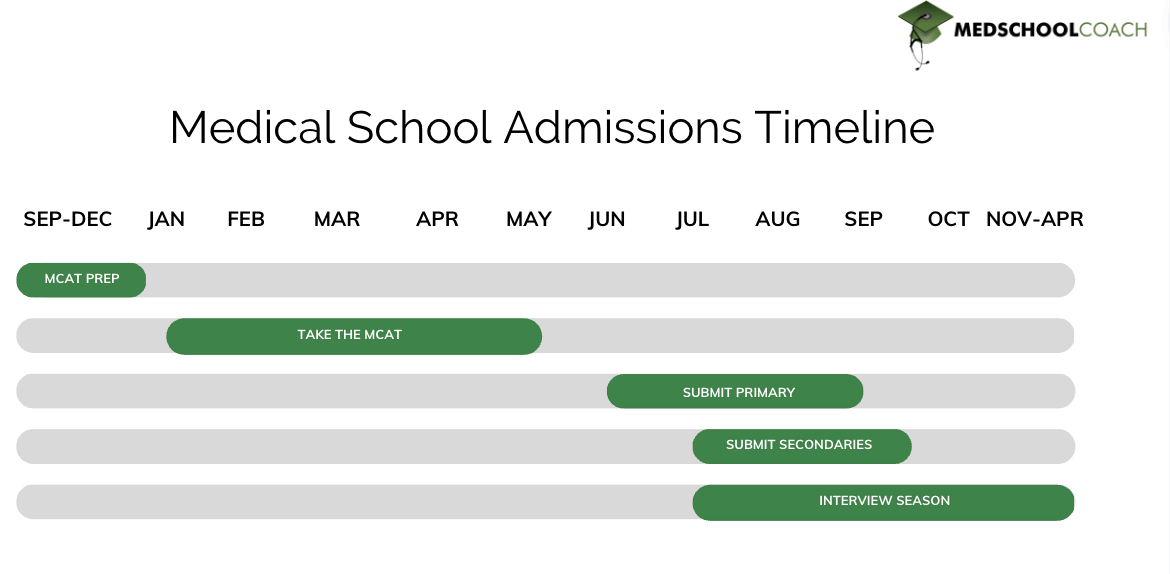
Table of Contents
AMCAS applications open in early May of each year, and new applications are accepted in late May or very early June. The application cycle culminates with final interviews and acceptance letters wrapping up around March of the following year. While the AAMC accepts applications almost year-round, it’s best to apply at the beginning of the cycle.
Unless you plan to take a gap year, you should begin preparing your med school applications during the spring semester of your junior year of premed studies (before May of your application cycle year).
Specific deadlines for submitting your application depend on the school you’re applying to and may range from September to December, but we never recommend waiting until the deadline approaches.
The AMCAS (American Medical College Application Service) is one of the 3 primary applications for pre-meds in the U.S. applying to MD (allopathic) medical programs. Applying to medical school is a significant process that requires a lot of preparation, paperwork, and time — for good reason.
Let’s review the ideal timeline for applying to medical school with AMCAS so you can have the best chance of getting into medical school.
Our clients are 2X more likely to get accepted than the average pre-med. Want to increase your odds? Let us help you each step of the way.
When Does AMCAS Open for 2025/26?
The AMCAS 2025-26 application opens on May 1, 2025. You won’t be able to submit your application until the end of the month.
Other medical school application systems for US students include AACOMAS (for DO programs) and TMDSAS (for Texas medical schools). AACOMAS opens on May 6, 2025, and TMDSAS opens on May 1, 2025.
Some students choose to apply to all 3 program types, but this is not a requirement.
A note on application cycle years: Because the medical school admissions process begins in May and ends the next March, we refer to the application cycle using both years. When you’re reviewing official AAMC data, note that they use only the second year (meaning the cycle that starts in May 2025 is referred to as “2026” only).
Important Dates
- May 1, 2025: AMCAS application opens for the 2025-26 cycle.
- May 28, 2025: Earliest date you can submit your AMCAS application for the 2025-26 cycle.
- May 2025: Last month to take the MCAT for a timely application. Schedule your MCAT test date with a score release date of no later than June 30th for best results. For the 2025/26 cycle, that means taking your MCAT on or before May 23, 2025. MCAT results typically take 30-35 days to release.
- June 2025: Taking the Casper exam or AAMC PREview is recommended (even if your preferred school doesn’t require it). Aim to take one of these situational judgment tests (SJTs) no later than the end of June 2025.
- June 27, 2025: First day the AMCAS applications will begin submitting to schools after going through the verification process.
- August 1, 2025: Deadline for the Early Decision Program.
- September–December 2025: Depending on the school you apply to, final deadlines for submitting your secondary applications will fall during this time. You must submit your application by 11:59 PM Eastern for any given school’s deadline, and AMCAS offers no deadline extensions.
Application Timeline: 2025-26 Cycle
Application deadlines can often be school-specific, but they typically fall between mid-October and early November in your application year.
Even though those are the deadlines, we do not recommend waiting until the last minute for any part of this journey. Your chances of matriculation may depend on applying early — especially for schools that accept students on a rolling basis.
January–April 2025
- Decide which medical schools you’ll apply to. The specific schools determine details of certain aspects of the process, such as exams you’ll need to take, ideal MCAT scores, and more.
- Collect letters of recommendation (AKA letters of evaluation). You don’t have to submit these with your primary application, but it’s a good idea to do it anyway. Schools will not evaluate a candidate’s secondary application without them. Putting in a request for individual and/or committee letters well in advance will help your letter writers provide thoughtful recommendations.
- Study for the MCAT. The best MCAT study schedule depends on your individual needs, but we find that most students need 3-6 months before their test day to prepare. For the best chance at success, invest in MCAT tutoring — our tutoring students increase their scores by an estimated 12 points or more.
- Take your MCAT, Casper, and/or AAMC PREview exams as early as possible. If possible, we recommend taking the MCAT by the end of April of your application cycle year. The best PREview or Casper test dates for your application cycle are by the end of May.
- Register with a pre-health committee if your school has one.
- Each medical school has different requirements, so consult MSAR to confirm the specific admission requirements for each school on your list.
- Begin brainstorming, outlining, and writing your personal statement. Prioritize storytelling, review examples from successful applicants, and get a few extra eyes on your draft(s) before officially uploading them to the application service.
- Outline and write out all of your extracurricular activities and work. You can list and describe up to 15 extracurriculars in the Work & Activities section of the AMCAS with up to 4 occurrences per experience. You’ll also be able to highlight up to 3 of these as “most meaningful”, so consider which experience had the most impact.
- If you plan on applying to a Texas medical school or an MD-PhD program, you will also want to start brainstorming, outlining, and writing your additional essays for those applications.
May 2025
- Open your AMCAS application as early as possible and begin filling out your background information in sections 1-3. AMCAS applications open May 1, 2025, and you can submit a full application as early as May 28, 2025.
- Order your official transcripts from all colleges and universities you’ve previously attended to complete the coursework section of your application (section 4 of the AMCAS).
- Send reminders to recommendation letter writers if they have not already provided the letters. You’ll add these letters of recommendation to section 6 of the AMCAS.
- Complete your medical school personal statement and extracurricular activities section by May 15, 2025.
- Decide exactly what schools you will be applying to and fill these out in section 7 of your application.
June 2025
- Take your MCAT no later than May 23, 2025, to ensure a score release date of late June. Submit your MCAT score in section 9 of your application.
- Take your Casper exam or AAMC PREview by the end of June 2025. Then, submit your results in section 9 of the AMCAS.
- Begin secondary essays and other requirements for secondary applications. You should start this immediately after you turn in your initial application, starting with your preferred school’s requirements first.
- Submit your AMCAS in early June. It’s important to use the several months before the AMCAS application opens, to improve the quality of your application. Once your application is submitted, it will take anywhere between 1 to 6 weeks to undergo AMCAS verification before being sent directly to schools.
July 2025
- Submit your secondary applications. Secondary or supplemental applications include up to 5 essays and an application fee (for most schools). If this fee is too much for you, you may request a waiver.
- Begin preparation for your medical school interviews. This includes reviewing common questions and answers, learning the traditional and MMI formats (depending on which schools you’ll interview with), and getting help from former admissions committee members.
- Monitor your application status via AAMC. Remember, the later you submit your application via AMCAS, the longer the verification process will take. The admissions process normally begins in mid-July.
August 2025
- If applying early decision to a single medical school, submit your Early Decision Program application by August 1, 2025.
September 2025–April 2026
- Complete your medical school interviews. Interview invitations can happen anywhere between September and March. Once you are selected for an interview, you’ll move on to the next step in the medical school application process. These may be virtual or in-person. To help you prepare, we’ve put together a few handy guides:
Medical School Interviews: What To Do Before, During & After
Common Medical School Interview Questions + Sample Answers
Medical School Interview Question: Why Do You Want to Go to This School?
- Await decisions from each school you interview with. Admissions decisions vary based on each school and may be made at any point between your interview date and March in your cycle year. Some schools may not immediately accept or reject your application but rather put you on a waitlist, meaning you’ll have to wait longer for their decision.
- Continue the admissions process even as you receive acceptance letters from the schools highest on your list. Some schools do rolling admissions, which means they will send acceptance letters a few weeks after your interview. Other schools will wait to make a final decision until March, assuring that all possible candidates were interviewed. Still, you should follow through with interviews as requested so that you have the option to select between multiple offers if you get them.
- If you don’t get accepted to the school you chose in the Early Decision Program, quickly submit applications to your other preferred schools. The EDP allows you to be accepted more quickly to the single school you choose, but you can’t apply to any other programs until you’ve been released from the EDP commitment.
January 2026 is technically the last month to submit primary applications for certain programs. We do not recommend waiting this long, as it is likely to hurt your chances of being accepted by any med school. Most med school application deadlines are actually in November, so waiting this long also greatly limits which schools you may apply to.
October 2025-May 2026
- Negotiate financial aid offers, attend second look day, and officially select a program to enroll in.
- Here are more helpful steps for what to do once you get accepted into medical school.
FAQs
Aim to submit your med school application as early as possible, preferably in early June of your cycle year. The longer you wait to submit, the lower your chances of being accepted get.
Deadlines for submitting your application via AMCAS depending on the schools you’re applying to but are generally between September and January. Check the AMCAS database for application deadlines for your preferred schools.
IMPORTANT: If you put your application off until just before the deadline, remember that you must request your transcripts no later than 2 weeks before your school’s application deadline. Otherwise, your application will not be processed by the deadline and you won’t be included in that school’s applicants for the cycle year.
You will need to take the MCAT no later than 35 days before your school’s AMCAS application deadline. Verify your MCAT score release date against your school’s application deadline. In general, this probably means the latest you can take the MCAT will typically be sometime between September and November (during the fall semester of your senior year of undergrad).
But waiting this long to take the MCAT is not a wise choice. We recommend taking the MCAT no later than May 23, 2025, but preferably before the end of April.
Almost every medical program in the U.S. requires the MCAT, although a few very competitive BS/MD programs and Early Assurance Programs (EAP) suspend this requirement due to the academic rigor of the program. If your MCAT score is lower than expected, consider applying to Caribbean medical schools or DO schools through AACOMAS.
Your MCAT score is typically a critical application data point that admissions committees use in student selection to medical school. Scores help admissions officers interpret grades and other academic data from undergraduate institutions with different curricular focuses and grading standards.
You should submit your secondaries as soon as possible after they are requested by the medical school. According to our suggested timeline, this means you should submit your secondary applications in July of your application cycle.
Yes, there is a precedent for AAMC moving the date that schools receive applications in extreme situations. The last time they did this was in 2020 due to the pandemic.
Get Expert Help With Your Medical School Application from MedSchoolCoach
Our Physician and Writing Advisors provide expert guidance with your personal narrative and school list strategy, writing your personal statement, and interview preparation. Our goal is to help you prepare a great application so you can stand out!
Join over 2,000 students who trust us every year to take their applications to the next level. Learn more on a FREE 15-minute consultation to find out how it can work for you!

Sahil Mehta MD
Dr. Mehta is the founder of MedSchoolCoach and has guided thousands of successful medical school applicants. He is also a practicing physician in Boston where he specializes in vascular and interventional radiology.






